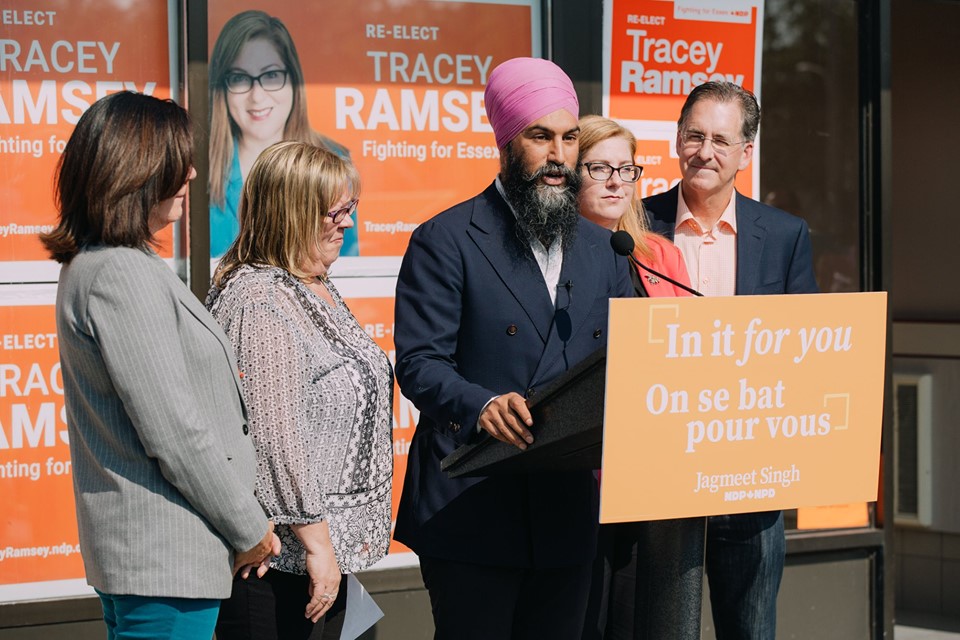
OTTAWA — NDP Leader Jagmeet Singh said Tuesday he is trying to fight support for Bill 21, Quebec’s controversial secularism law, among Quebecers by proving to them that a man who wears a turban does in fact share their values.
But Singh is pushing back against accusations he is being less than clear about whether he thinks the federal government should help challenge the bill in court.
“One thing I want to make really clear is I don’t believe in interfering with the court decision right now,” he said at a campaign event in Toronto Tuesday morning.
Singh said if the case ends up in the Supreme Court of Canada then Ottawa “has the right to review what is going on.”
Every time he’s been pressed to say whether that means he’d seek intervener status — the right to make arguments against the bill in court — however, Singh has said he doesn’t want to “interfere.”
As the dust settled Tuesday following the chaotic English-language leaders’ debate, Singh was partly basking in opinions that he had performed well, perhaps adding some vim to his campaign at a critical juncture.
But he is being dogged by Bill 21, described by some leaders and pundits as the most racist law in recent Canadian history. It bars many public servants from wearing religious symbols or garments at work. That includes teachers, government lawyers, judges, and provincial and municipal police officers. Some Quebec residents who loathe the law are challenging it as discriminatory in a provincial court.
Though it only affects Quebec, the stances federal leaders are taking on whether they would use federal powers to challenge it as discriminatory have become an issue both within and outside Quebec in the federal campaign, a test for how far federal leaders are willing to go to support minority rights. The issue has quietly percolated throughout the campaign but was brought to the forefront at leaders’ debates in French and English in the last week.
Singh, the only one of those leaders who himself would be unable to work under the law, has been condemned for being unclear about challenging the bill. He seemed to take different stances during Monday’s debate and in the following press conference, mostly landing on saying that of course he dislikes the bill but still thinks he can’t “interfere” in the provincial case.
He was challenged on his position again Tuesday at a campaign event in Toronto, where he said the vast majority of people in Quebec like the law so he is going to work instead to convince them they’re wrong by wearing his turban proudly in Quebec as he pushes his other values including standing up for LGBTQ rights and a woman’s right to choose.
“I know this is absolutely having impact in Quebec,” he said. “We’re winning over hearts. The conversation is changing.”
Hogwash, said Fareed Khan, founder of Canadians United Against Hate. He said he is “gobsmacked” at Singh’s lack of conviction to go after the bill. “Changing hearts” is something that will take years to do, said Khan, which means Singh is willing to let Quebec minorities suffer in the meantime, or be forced to move.
“Of all the people, I would think he would be the one who would be leading the charge to say not only is this wrong but were I to become prime minister I would immediately take action legally,” said Khan.
Khan said that action could include asking for intervener status in the provincial case, or directly referring a question about the constitutionality of such a bill to the Supreme Court.
Conservative Leader Andrew Scheer has been clear he won’t challenge the legislation now or in the future, reiterating that position during a campaign event in Toronto Tuesday.
Green Leader Elizabeth May has said something similar: that she doesn’t agree with the law but that Quebec is different and she won’t touch it. She has suggested before that she would help people who can’t work in Quebec because of the law to find jobs elsewhere.
Khan said none of the leaders can hold their heads high as defenders of minority and religious rights but he credits Liberal Leader Justin Trudeau for leaving the door open widest for a federal legal case against the bill.
Trudeau nudged that door open a little wider this week, saying if the Quebec court case doesn’t overturn the legislation, if he is the prime minister he would step in to challenge it.
“I believe a federal government must always be there to defend religious rights,” Trudeau said Tuesday, during a campaign stop in Iqaluit.
But Khan said the leaders are terrified of offending voters in Quebec, which has 78 seats, almost a quarter of the House of Commons.
“Human rights should not be sacrificed on the altar of political expediency,” said Khan.
For Trudeau this campaign has become partly about proving to Canadians that he is not racist, after several photos emerged of him wearing blackface or brownface as a younger man, making it more important for him to try to stake out territory as the leader with the strongest stance against Bill 21.
He is also looking to make his stance against Bill 21 a factor in English Canada, where support for the concept of similar laws is low and some ridings with large visible-minority populations in and around Toronto and Vancouver could be where this election is won or lost.
On the flip side, the NDP are said to have lost ground in Quebec in 2015 when then leader Tom Mulcair spoke out against a federal Conservative ban on wearing face-coverings at citizenship ceremonies, a rule federal courts said was unlawful.
Khan said he thinks this issue is going to be part of the decision-making process for voters outside Quebec.
The Toronto region’s importance in the campaign was clear when all Scheer and Singh both campaigned there Tuesday morning, and Trudeau headed there for events Wednesday after spending Tuesday in Iqaluit.